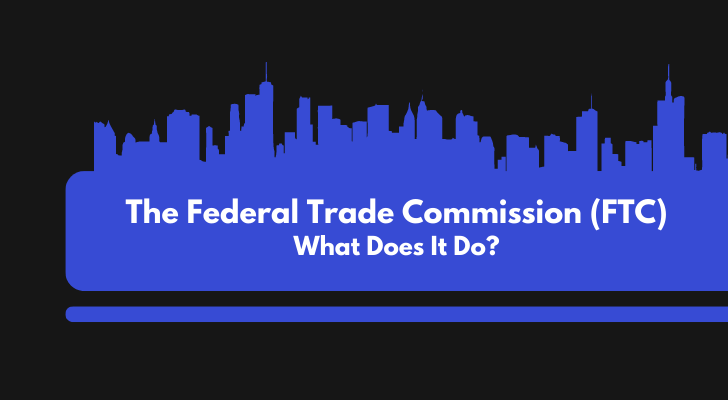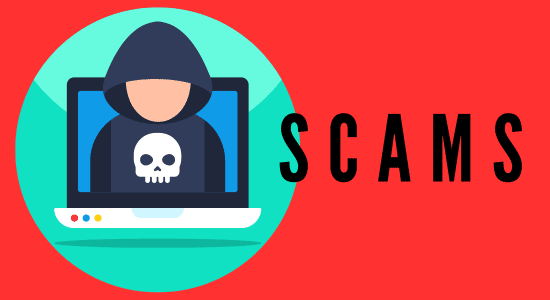The Federal Trade Commission (FTC) is a government agency that plays a crucial role in protecting consumers and promoting fair competition in the marketplace. From cracking down on deceptive advertising to ensuring businesses comply with antitrust laws, the FTC has been working tirelessly for over 100 years to safeguard the interests of American consumers.
So let's take a closer look at what exactly the FTC does, its powers and enforcement actions, and how it impacts both consumers and businesses alike. We're about to learn everything you need to know about one of America's most important regulatory bodies!

What is the Federal Trade Commission?
The Federal Trade Commission (FTC) is an independent government agency established in 1914 by the Federal Trade Commission Act. The FTC's primary mission is to protect consumers and promote competition through the enforcement of consumer protection and antitrust laws. It has five commissioners who are appointed by the president for a term of seven years, with no more than three members from any one political party.
One of the unique aspects of the FTC is its broad authority to investigate and prosecute businesses engaged in unfair or deceptive practices that harm consumers, ranging from false advertising to identity theft. They can also challenge mergers and acquisitions that may lead to decreased competition in a particular market.
In addition to enforcement actions, the FTC also conducts research on various marketplace issues affecting consumers such as privacy, data security, fraud prevention, and emerging technologies.
The FTC plays a critical role in protecting American consumers from abusive business practices while promoting healthy competition among companies. Its work impacts virtually every aspect of our daily lives as it strives towards creating a level playing field for all participants in America's free-market economy.
What Does the FTC Do?
One of the main functions of the FTC is to enforce federal antitrust laws by reviewing mergers and acquisitions, investigating anti-competitive behavior, and challenging monopolies. The agency also works to prevent fraud and deception in advertising, marketing, and sales practices.
In addition, the FTC has a wide range of responsibilities related to consumer protection. For example, it enforces laws related to data privacy and security, as well as regulations governing telemarketing calls and email spam. The agency also provides guidance on issues such as identity theft prevention and credit reporting.
Beyond its enforcement activities, the FTC engages in education initiatives aimed at promoting consumer awareness about marketplace issues. This includes publishing reports on emerging trends in industries ranging from healthcare technology to virtual reality gaming.
The FTC serves a critical role in regulating business conduct while advocating for consumer interests across a broad spectrum of sectors.
The FTC's Powers and Enforcement Actions
One of the primary tools at the FTC's disposal is its ability to issue subpoenas and conduct investigations into potentially illegal activities. This allows the agency to gather information about companies that may be engaging in fraudulent or deceptive behavior.
If it finds evidence of wrongdoing, the FTC can take legal action against offending companies under Section 5 of the Federal Trade Commission Act. The agency can seek injunctions, forcing companies to stop their illegal activities, as well as restitution for consumers who were harmed by these actions.
In addition to taking legal action against individual businesses, the FTC also works with other agencies and organizations to promote industry-wide compliance with consumer protection regulations. The agency frequently publishes guidelines and advice for businesses on how to avoid running afoul of antitrust laws or other regulations.
Through its powers of investigation and enforcement, as well as its work promoting ethical business practices across industries, the FTC plays an essential role in ensuring that American consumers are protected from harmful business practices.
The FTC and Consumer Protection
The Federal Trade Commission was established to ensure that consumers are protected in the marketplace. The FTC plays a significant role in regulating and enforcing laws relating to consumer protection.
One of the primary responsibilities of the FTC is to prevent deceptive business practices. This includes false advertising, bait-and-switch tactics, and other fraudulent activity that can harm consumers financially or otherwise.
The agency also investigates companies for unfair practices such as abusive debt collection techniques or discriminatory pricing policies. In addition, it works to protect consumer privacy by monitoring data breaches and ensuring proper disclosure of personal information.
Another key function of the FTC is education and outreach. The agency provides valuable resources for consumers on its website, including tips for avoiding scams and recognizing fraudulent activity.
The mission of the FTC is vital in protecting American consumers from unscrupulous businesses. By enforcing regulations against deception and unfairness, promoting awareness through education campaigns, and advocating for consumer rights at all levels of government – we can be confident that our interests are being looked after by this important regulatory body.

What Kind of Scams Can The Federal Trade Commission Help You Avoid?
FTC can help you avoid a wide range of scams and fraudulent activities. Here are some common types of scams that the FTC can provide guidance and resources on:
- Phishing Scams: These scams involve fraudulent emails, text messages, or calls that attempt to deceive you into providing personal information, such as passwords, social security numbers, or bank account details. The FTC provides information on how to recognize and avoid phishing attempts.
- Identity Theft: Identity theft occurs when someone steals your personal information to commit fraud or other criminal activities. The FTC offers resources to help you prevent identity theft and provides guidance on what steps to take if you become a victim.
- Imposter Scams: Imposter scams involve individuals posing as government officials, tech support representatives, or other trusted entities to trick you into providing money or personal information. The FTC provides information on how to spot and avoid imposter scams.
- Online Shopping Scams: With the rise of online shopping, there are scams related to fake websites, counterfeit products, and non-delivery of items. The FTC offers tips on safe online shopping practices and how to recognize and report fraudulent sellers.
- Investment and Money-Making Scams: The FTC provides resources to help you identify and avoid investment scams, pyramid schemes, and get-rich-quick schemes that promise unrealistic returns. They also provide information on how to research and verify investment opportunities.
- Charity Scams: Scammers may exploit your generosity by posing as charitable organizations. The FTC provides guidance on how to research charities and avoid donating to fraudulent causes.
They also address issues related to debt collection, credit card fraud, robocalls, and many other deceptive practices. The FTC's primary goal is to protect consumers from fraudulent activities and provide resources to help individuals avoid falling victim to scams.
The FTC and Businesses
The FTC doesn't only have the responsibility to protect consumers, but also to ensure fair competition in the marketplace. When it comes to businesses, the FTC has several rules and regulations that they must abide by.
One of the most important things for businesses to keep in mind is truth in advertising. This means that any claims made about a product or service must be truthful and backed up by evidence. The FTC will investigate if there are any false or misleading statements.
Another area of concern for the FTC is data privacy and security. Businesses must take steps to protect consumer information from being stolen or misused. The FTC can bring enforcement actions against companies that fail to properly safeguard customer data.
In addition, businesses need to be careful about avoiding anti-competitive behavior such as price-fixing, bid-rigging, and monopolization. These actions can harm consumers and other competitors in the market which goes against what the FTC stands for.
For all these reasons, all businesses should understand their obligations under federal law when it comes to matters concerning consumer protection and fair competition practices in order not get into trouble with this agency.
How To Report a Scammer To FTC
To report a scammer, you can follow these steps:
- Visit the FTC's official website at www.ftc.gov.
- Look for the "Report a Scam" or "File a Complaint" option on the FTC's homepage. It is usually located in the top navigation menu or in the "Consumer Information" section.
- Click on the "Report a Scam" or "File a Complaint" link. This will direct you to the FTC's online complaint assistant.
- Follow the instructions provided by the online complaint assistant. You will be asked to provide details about the scam, including the type of scam, the parties involved, the date and method of contact, and any relevant information or documentation you may have.
- Provide your personal information, such as your name and contact details. The FTC may use this information to follow up with you if needed.
- Review and submit your complaint. Take a moment to ensure that all the information you provided is accurate and complete before submitting your complaint.
Additionally, you can also report scams to the FTC by calling their toll-free hotline at 1-877-FTC-HELP (1-877-382-4357). The hotline is staffed by trained representatives who can assist you in filing a complaint or providing guidance on specific scam-related concerns.
Remember to keep any documentation or evidence related to the scam, such as emails, text messages, receipts, or any other relevant communication or transaction records. This information can be useful when filing your complaint and assisting the FTC in their investigation.
Reporting scams to the FTC helps them track trends, identify patterns, and take appropriate legal action against scammers. It also contributes to the protection of other consumers by raising awareness and preventing further fraudulent activities.
Does FTC Only Help USA Residents?
FTC primarily serves and provides assistance to residents of the United States. Its jurisdiction is focused on protecting American consumers from fraudulent and deceptive practices within the United States.
However, the FTC also collaborates with international counterparts and shares information with consumer protection agencies around the world. While they may not directly resolve individual complaints or issues for non-U.S. residents, they play a role in global efforts to combat scams and fraudulent activities.
If you are located outside the United States and have been scammed or need assistance with consumer protection issues, it is recommended to contact your local consumer protection agency or relevant law enforcement authorities in your country. These organizations are typically responsible for handling consumer complaints and addressing fraudulent activities within their jurisdictions.
The Future of the FTC
As we move forward into the future, it is clear that the role of the Federal Trade Commission will continue to be an essential part of ensuring fair competition and protecting consumers from deceptive business practices. With technology advancing at an unprecedented pace, new challenges will arise that require the FTC's attention. However, with its powers and enforcement actions firmly in place, and a commitment to consumer protection at its core, there is no doubt that the FTC will continue to fulfill its crucial mission for years to come.
How I "Finally" Make Over $7,000 Monthly Income
"The most valuable thing I've ever done!"
